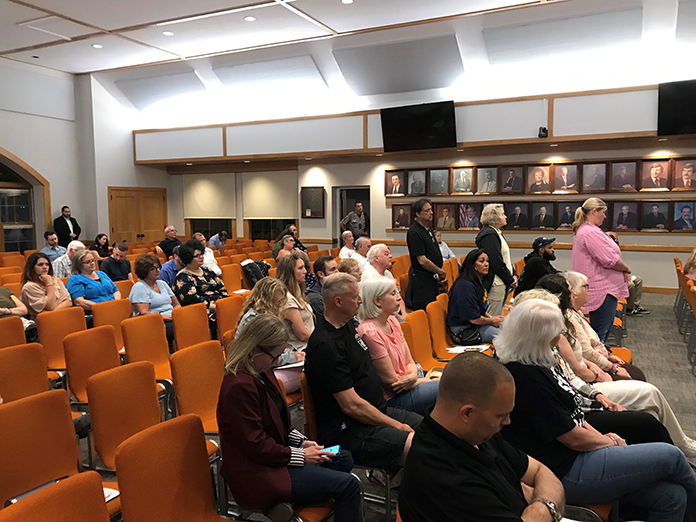
TOMS RIVER – The municipal budget for the year was passed but some people still want to find money to keep the Toms River Animal Shelter under local control.
The 2024 budget is $142,783,275.18. It is an increase of $1,913,128.48 from last year’s $140,870,146.70.
The amount to be raised by taxes will be $89,377,095.38. It is an increase of $378,850.23 from last year’s $88,998,245.15.
For the home based on the average assessment of $446,100, their municipal tax bill of $7,721.99 would stay the same, said Business Administrator Jonathan Salonis.
Towns build their budgets throughout the calendar year, which is why the vote for this is happening in May. The town collects taxes for the school district, county government, and other entities. This article is only about the municipal budget.
While several figures were questioned during the Township Council meeting when the budget was voted on, the most questions were about the animal shelter.
Toms River approached the county to see if they could take over the Toms River Animal Shelter. A petition drive was held to keep it under local control.

Advocates for the shelter asked the governing body to find money to continue its operation. Mayor Daniel Rodrick and his allies on the council and administration have said that there is no money in the budget. Shelter advocates have said that this is by choice, and that if they wanted to fund it, they could.
There’s already money donated to the shelter from a will of someone who passed away. The fate of that $1 million has been in discussion for months.
The money is going to stay with the animals, no matter who is running the facility, Rodrick said. He added that the deceased also provided money for the county shelter. Therefore, it would not be against her wishes to have the county take over.
Resident Debbie Curci asked what will happen with the debt the town owes on the shelter? When it was built by a previous administration, the town borrowed money for it. The town is still paying off that loan. Some critics of closing the shelter said it is not a good idea financially to give away a property that taxpayers are still paying for.
Rodrick said that the debt for that building gets rolled in with other debt every year.
Councilman James Quinlisk, who is from a different political group than the mayor, said this is a “shell game.” The debt doesn’t go away. The town still owes it, and it doesn’t matter whether the debt is rolled into something else or not.
Rodrick has said that the shelter is poorly run and that the animals were not cared for. Residents have shown that they were cared for and that the problems of the past shelter management are gone.
“This is not a successful business,” Rodrick said of the shelter.
“It’s not a business. It’s a service to the people of Toms River,” Quinlisk said.
Resident Phil Brilliant said that at the end of last year, there was $47 million in surplus. Of that, $20 million is being used to balance this year’s budget.
With all the money being used in surplus, couldn’t there be $500,000 found to keep the shelter?
He noted that there is $1.6 million being spent on legal fees and $2 million for an information technology department.
Rodrick said that a certain amount of money has to be kept in reserves. If it goes too low, it affects the town’s bond rating.
A bond rating is like a credit score for a town. The better it is, the better your rates are when you borrow money.
Resident Julie Adamek asked why there are different numbers being used at different meetings. At one meeting, town officials said the shelter costs half a million dollars to run. At this meeting, it was said it costs $1 million.
Resident Tom Fredella said that there was already $300,000 allocated for the shelter, so it’s not about finding half a million dollars, it’s about finding another $200,000.
Councilman Thomas Nivison suggested that the town cut back on renovating one park and use the money for the shelter.
Rodrick answered that it matters where the money comes from. You can borrow money for a project – such as a park – but not for people – such as staff at the shelter.
Councilman Justin Lamb said the budget is responsible. Increases in raises came from employee contracts from previous administrations. He voted “yes.”
Councilwoman Lynn O’Toole said that two and a half years ago there was a very large tax increase that really hit seniors hard. “They’re struggling and they’re still struggling.” She voted “yes.”
Councilman David Ciccozzi said that the actual budget is up by about $1.4 million. He saw that legal fees are up by $300,000 from last year. The budget lists $1.7 million in revenue in the form of interest and investments. He said he didn’t know what that was. He voted “no.”
Nivison said he thought that the council members would have meetings about the budget so they could be more informed before voting.
“I’m going to put my trust and confidence in the company we hired” to craft the budget. “I would be in favor of paying a higher tax to keep the shelter.”
He abstained from voting.
Councilman George Lobman voted “yes” without making many comments during the discussion.
Quinlisk said that there was never a committee meeting to discuss the budget and he never got the chance to talk to the auditor.
“This budget is a farce,” he said, and voted “no.”
He noted that the town lost 64 employees in the first four months of the year, through being fired or quitting.
Council President Craig Coleman said that in his 32 years as a school administrator, he learned to trust in the professionals doing the work like crafting budgets so he voted “yes.”






